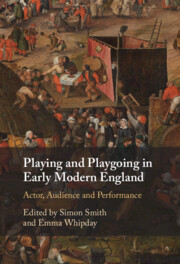Refine search
Actions for selected content:
14 results
IV - The Historian’s Deeds
-
- Book:
- Authority and Tradition in Ancient Historiography
- Published online:
- 31 January 2025
- Print publication:
- 06 February 2025, pp 175-216
-
- Chapter
- Export citation
4 - Translationality and the Decolonial Gesture in Performance
-
- Book:
- Contemporary Performance Translation
- Published online:
- 19 December 2024
- Print publication:
- 12 December 2024, pp 115-147
-
- Chapter
- Export citation
3 - Translationality and the Atypical Actor in Performance
-
- Book:
- Contemporary Performance Translation
- Published online:
- 19 December 2024
- Print publication:
- 12 December 2024, pp 87-114
-
- Chapter
- Export citation
1 - The Making Sense
- from Part I - The Making Sense
-
- Book:
- The Making Sense of Politics, Media, and Law
- Published online:
- 06 April 2023
- Print publication:
- 13 April 2023, pp 3-22
-
- Chapter
-
- You have access
- Open access
- HTML
- Export citation
Introduction
-
-
- Book:
- Playing and Playgoing in Early Modern England
- Published online:
- 10 March 2022
- Print publication:
- 17 March 2022, pp 1-12
-
- Chapter
- Export citation

Playing and Playgoing in Early Modern England
- Actor, Audience and Performance
-
- Published online:
- 10 March 2022
- Print publication:
- 17 March 2022
22 - Creativity Development and Culture
- from Part IV - Environments and Contexts
-
-
- Book:
- The Cambridge Handbook of Lifespan Development of Creativity
- Published online:
- 19 November 2021
- Print publication:
- 25 November 2021, pp 480-494
-
- Chapter
- Export citation
Chapter 15 - Othello
-
-
- Book:
- The Cambridge Companion to Shakespeare and Race
- Published online:
- 09 February 2021
- Print publication:
- 25 February 2021, pp 223-236
-
- Chapter
- Export citation
Chapter 10 - Boy Parts in Early Shakespeare
-
-
- Book:
- Early Shakespeare, 1588–1594
- Published online:
- 17 April 2020
- Print publication:
- 30 April 2020, pp 220-234
-
- Chapter
- Export citation
Chapter 9 - The Provincial Commencement of James Field Stanfield
- from Part III - Enlightened Perspectives
-
-
- Book:
- Ireland, Enlightenment and the English Stage, 1740-1820
- Published online:
- 22 July 2019
- Print publication:
- 01 August 2019, pp 205-225
-
- Chapter
- Export citation
Part III - Enlightened Perspectives
-
- Book:
- Ireland, Enlightenment and the English Stage, 1740-1820
- Published online:
- 22 July 2019
- Print publication:
- 01 August 2019, pp 165-248
-
- Chapter
- Export citation
Precarious Professions: Insolvency and Bankruptcy among Theatrical Artistes in Victorian and Edwardian England
-
- Journal:
- New Theatre Quarterly / Volume 33 / Issue 4 / November 2017
- Published online by Cambridge University Press:
- 11 October 2017, pp. 386-402
- Print publication:
- November 2017
-
- Article
- Export citation
Part XXVII - Shakespeare and the Visual Arts
-
-
- Book:
- The Cambridge Guide to the Worlds of Shakespeare
- Published online:
- 17 August 2019
- Print publication:
- 21 January 2016, pp 1861-1906
-
- Chapter
- Export citation
262 - Graphic Satire
- from Part XXVII - Shakespeare and the Visual Arts
-
-
- Book:
- The Cambridge Guide to the Worlds of Shakespeare
- Published online:
- 17 August 2019
- Print publication:
- 21 January 2016, pp 1879-1884
-
- Chapter
- Export citation
